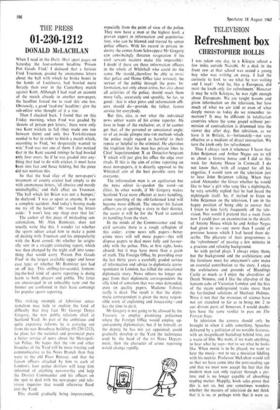Refreshment box
TELEVISION CHRISTOPHER HOLLIS
1 was taken one day to a Kikuyu school a few miles outside Nairobi. At a desk in the front row at that school was seated a young boy who was writing an essay. I had the curiosity to look to see what he was writing and I read: 'And he, like a European, did twist the knob only for refreshment.' However it may be with Kikuyus, he was right enough about Europeans. We are taught lessons and given information on the television, but how much of what we are told or even of what deeply moves us today do we remember to- morrow? It may be different in totalitarian countries where the same gospel without per- mission of contradiction is drummed into the viewer day after day. But television, as we have it in Britain, is—fortunately—not very effective as a medium of direct instruction. We turn the knob only for refreshment.
Thus I always turn it whenever I learn that John Betjeman and Arthur Negus are to tell us about a historic house and I did so this week for Antony House in Cornwall. I do not know that, with all respect for all his expertise, I would turn on the television just to hear John Betjeman talking. When they asked Alexander the Great whether he would like to hear'a girl who sang like a nightingale, he very sensibly replied that he had heard the nightingale itself. So, if invited to listen to John Betjeman on the television, I am in the happy position of being able to answer that I listen to him fairly frequently off the tele- vision. Nor would I pretend that a week from now I could pass an examination in the details of Antony House which he and Arthur Negus had given to us—any more than I could of previous houses which I had heard them de- scribe. The pleasure of their programmes is the 'refreshment' of passing a few minutes in a gracious and relaxing background.
So with period plays. I always enjoy them, but the background and the architecture and the furniture must for enjoyment's sake make an essential contribution to the story. I enjoy the architecture and grounds of Blandings Castle as much as I enjoy the absurdities of Derek Nimmo, and I like the clip-clop of the hansom cabs of Victorian London and the hiss of the steam underground trains more than the far-fetched solutions of Sherlock Holmes. 'Were it not that the resources of science have not yet stretched so far as to bring BBC 2 to our distant parts of Somerset, I would doubt- less have the same verdict to pass on The Forsyte Saga.
In television the camera should only be brought in when it adds something. Speeches delivered by a politician of no notable features, With an insignificant backdrop behind him, are `a waste of film. We want, if we want anything, to hear what he says—not to see what he looks like. When music is to be played, we want to hear the music—not to see a musician fiddling with his necktie. Professor McLuhan would tell us that we have come into the post-reading age and that we must now accept the fact that the modern man can only register through a pic- ture and is no longer capable of absorbing reading matter. Happily, book sales prove that this is not so, but one sometimes wonders whether the masters of television do not think that it is so, or perhaps wish that it were so.






























 Previous page
Previous page